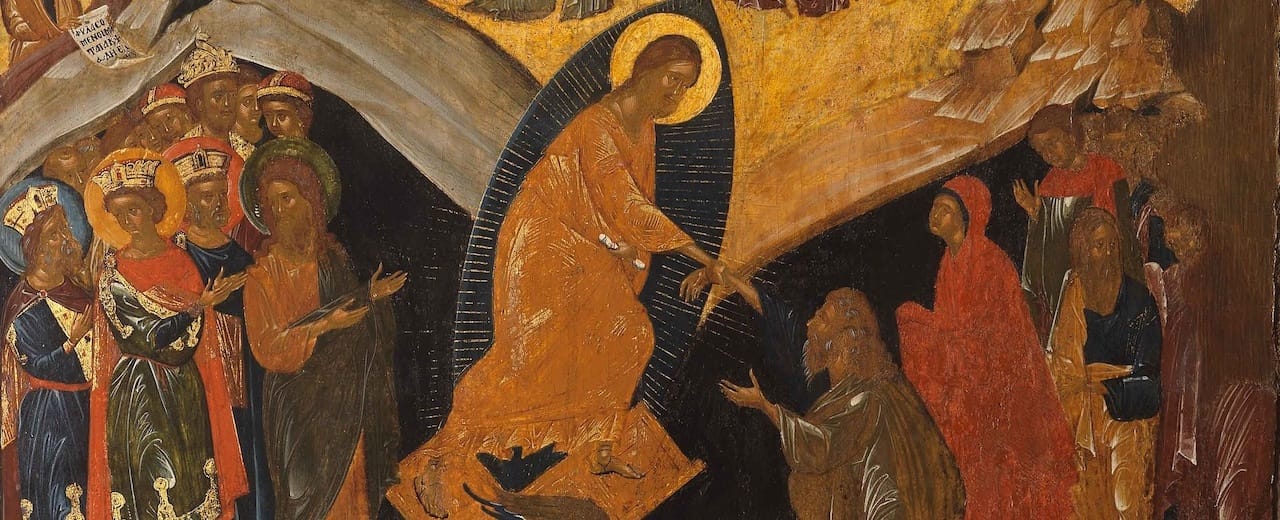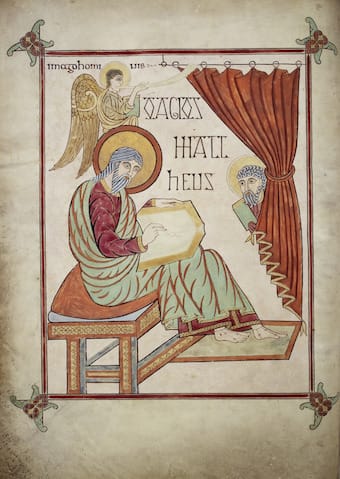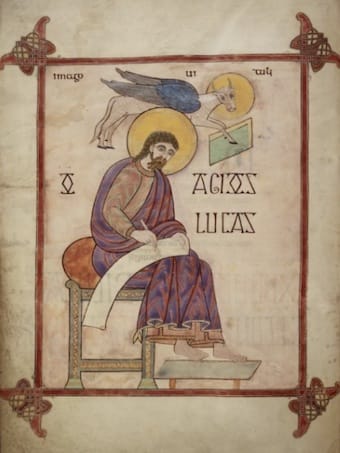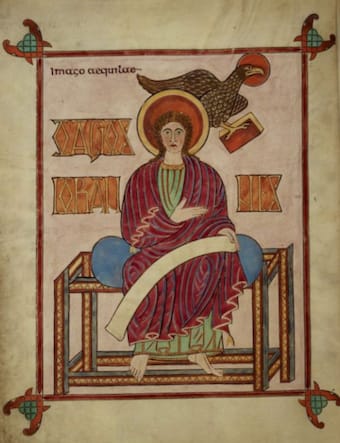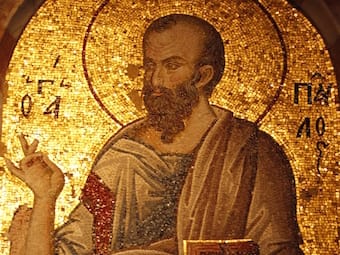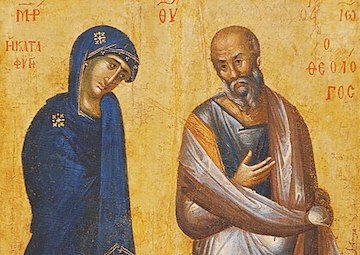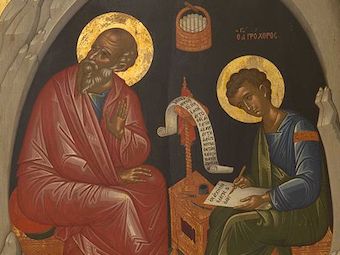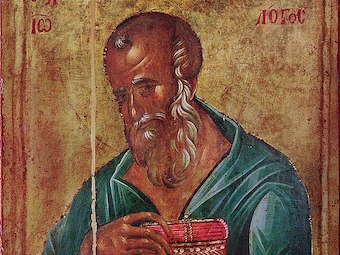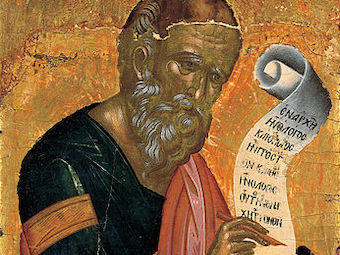Introduction
The New Testament is the name for a collection of twenty-seven ancient Christian documents, comprising histories and letters written by the Apostles themselves. It is so named because at his Last Supper with his Apostles, Jesus Christ declared that the bread and wine he gave them were a new covenant (or testament) in his blood. This fulfilled a prophecy given through Jeremiah some six centuries before, promising that God would one day reaffirm all the covenants that God had made with Israel, but in an entirely new way.
1
Picture: From the British Library, via Wikimedia Commons. Licence: CC0 1.0 Universal Public Domain Dedication.. Source.
2
Picture: From the British Library, via Wikimedia Commons. Licence: CC0 1.0 Universal Public Domain Dedication.. Source.
3
Picture: From the British Library, via Wikimedia Commons. Licence: CC0 1.0 Universal Public Domain Dedication.. Source.
4
Picture: From the British Library, via Wikimedia Commons. Licence: CC0 1.0 Universal Public Domain Dedication.. Source.
5
The story of the early Christian churches from the outpouring of the Holy Spirit at Pentecost to St Paul’s appeal to Caesar in Rome, told by St Luke, author of the third Gospel.
Picture: Via Wikimedia Commons. Licence: Public Domain.. Source.
6
A letter written to the church at Rome by St Paul, in which he explains how Jesus Christ fulfilled God’s covenant with Abraham by bringing Jews and Gentiles together into one chosen people.
Picture: By Andrey Rublev (?1360-?1430), via Wikimedia Commons. Licence: Public Domain.. Source.
7
A letter written to the church at Corinth in Greece by St Paul, in which he addresses the role of the Law of Moses in the moral life of the Christian churches.
Picture: Via Wikimedia Commons. Licence: Public Domain.. Source.
8
A second letter to the Christians in Corinth, in which St Paul addresses self-described ‘Apostles’ who tried to alter the gospel message.
Picture: Via Wikimedia Commons. Licence: Public Domain.. Source.
9
A letter to the Christians in Galatia, in modern-day Turkey, in which St Paul deals with those who wanted Christians to get circumcised and keep the Jewish law in order to escape persecution by the authorities.
Picture: Via Wikimedia Commons. Licence: Public Domain.. Source.
10
A letter to the Christians at Ephesus in modern-day Turkey, in which St Paul speaks of the ‘armour of God’ that every Christian should wear.
Picture: Via Wikimedia Commons. Licence: Public Domain.. Source.
11
A letter to the Christians of Philippi in Greece, in which St Paul explains more about who Jesus Christ really was.
Picture: Via Wikimedia Commons. Licence: Public Domain.. Source.
12
A letter to the Christians of Colossae in Greece, in which St Paul presents Jesus Christ as the incarnation of God’s wisdom.
Picture: © José Luiz Bernardes Ribeiro, Wikimedia Commons. Licence: CC BY-SA 3.0.. Source.
13
A letter to the Christians of Thessaloniki in Greece, in which St Paul exhorts them to conduct themselves in a manner that is a credit to their faith.
Picture: Via Wikimedia Commons. Licence: Public Domain.. Source.
14
A further letter to the Christians of Thessaloniki in Greece, in which St Paul exhorts his readers to remain steadfastly committed to Christian tradition.
Picture: Via Wikimedia Commons. Licence: Public Domain.. Source.
15
A letter from St Paul’s to his young protege Timothy, seeking to build his confidence as he takes on the responsibilities of a bishop.
Picture: Via Wikimedia Commons. Licence: Public Domain.. Source.
16
Picture: Via Wikimedia Commons. Licence: Public Domain.. Source.
17
A letter from St Paul to Titus, to whom the Apostle had entrusted the management of the church in Crete, urging him to keep good relations with the secular powers while remaining committed to Christian doctrine.
Picture: Via Wikimedia Commons. Licence: Public Domain.. Source.
18
A letter from St Paul to a man named Philemon, asking him to forgive runaway slave Onesimus, and even treat him henceforth as a brother.
Picture: Via Wikimedia Commons. Licence: Public Domain.. Source.
19
A letter addressed to readers of Jewish background, explaining that Jesus was not a prophet or an angel, but the incarnation of God’s own Wisdom, and that he fulfilled many prophecies in the Scriptures.
Picture: Via Wikimedia Commons. Licence: Public Domain.. Source.
20
A letter to all the churches from St James, the first bishop of Jerusalem and a brother of Jesus Christ, in which he urges them to endure discrimination, and to anoint the sick for their healing.
Picture: Via Wikimedia Commons. Licence: Public Domain.. Source.
21
A letter from St Peter to all the churches, concerning family duties, the duties of clergy, and the duties of hospitality and kindness.
Picture: Via Wikimedia Commons. Licence: Public Domain.. Source.
22
Another letter by St Peter, warning of false apostles preaching a deceiving gospel, and warning that Christ will come to judge the world without warning.
Picture: Via Wikimedia Commons. Licence: Public Domain.. Source.
23
A letter to all the churches from St John, author of the fourth Gospel, in which he emphasises his personal friendship with Jesus, and reminds of the ‘new commandment’ of love.
Picture: © Orjen, Wikimedia Commons. Licence< CC BY-SA 3.0.. Source.
24
A second letter to all the churches from St John, author of the fourth Gospel, warning Christians not to listen to any doctrine but that of the incarnation, the coming of Christ in the flesh.
Picture: Emmanuel Lambardos (1602), via Wikimedia Commons. Licence: Public domain.. Source.
25
A third letter from St John, author of the fourth Gospel, to a church where one man has made himself ruler and has barred John from visiting.
Picture: © Joergens.mi, Wikimedia Commons. Licence: CC BY-SA 3.0.. Source.
26
A letter to all the churches written by St Jude, a brother of Jesus Christ, in which he warns against men who have infiltrated the churches and are undermining traditional doctrine and morality.
Picture: By Georges de La Tour (1593–1652). Source.
27
The vision seen by St John (author of the fourth Gospel) during Sunday worship on the island of Patmos, in which the courts of heaven are glimpsed, and the promise of a New Creation and a New Jerusalem is made to the faithful who endure.
Picture: By Andreas Ritzos (1421–1492), via Wikimedia Commons. Public domain image.. Source.
Archive
Previous: The Apocrypha Next: The Old Testament
